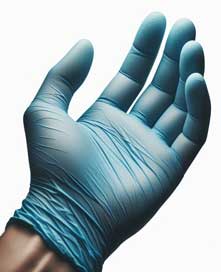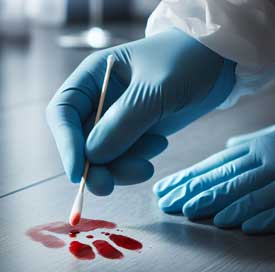Wearing gloves while processing a crime scene
Steven Staggs
See also the instructional videos on "Evidence Collection"
It is common practice to wear gloves while processing a crime scene. But why, when and what type of gloves?

There are two primary reasons for wearing gloves while processing a crime scene. One is to protect us from the evidence. The other is to protect the evidence from us.
Protection from the evidence
When we are using gloves for our protection, we are attempting to protect ourselves from biohazardous substances such as blood, urine and semen. On December 6, 1991, OSHA issued Title 29, Section 1910.1030, of the Code of Federal Regulations (CFR), Bloodborne. Occupations at risk for exposure to bloodborne pathogens include law enforcement, emergency response, and forensic laboratory personnel.
Fundamental to the bloodborne pathogens standard is the concept of following universal precautions. This concept is the primary mechanism for infection control. It requires that employees treat all blood, body fluids, or other potentially infectious materials as if infected with bloodborne diseases, such as the hepatitis B virus (HBV), the hepatitis C virus (HCV), and the human immunodeficiency virus (HIV). The following protective measures should be taken to avoid direct contact with potentially infectious materials:
- Use barrier protection—such as disposable gloves, coveralls, and shoe covers—if contact with potentially infectious materials may occur. Change gloves when torn or punctured or when their ability to function as a barrier is compromised. Wear appropriate eye and face protection to protect against splashes, sprays, and spatters of potentially infectious materials.
- Remove gloves and other personal protective equipment in a manner that will not result in contaminating unprotected skin or clothing.
- Wash hands after removing gloves or other personal protective equipment.
- Prohibit eating, drinking, smoking, or applying cosmetics where human blood, body fluids, or other potentially infectious materials are present, regardless of personal protection that may be worn.
- Place contaminated sharps in appropriate closable, leak-proof, puncture-resistant containers when transported or discarded. Label the containers with a BIOHAZARD warning label.
- Do not bend, re-cap, remove, or otherwise handle contaminated needles or other sharps.
- After use, decontaminate equipment with a daily prepared solution of household bleach diluted 1:10 or with 70 percent isopropyl alcohol or other appropriate disinfectant. Allow sufficient contact time for complete disinfection.
Protecting the evidence from us
To protect the evidence we wear gloves to avoid placing our fingerprints on evidence and to avoid cross contaminating the evidence.

Cross contamination is a real issue at crime scenes when evidence may include DNA. We don't want to place our DNA on evidence we collect and we don't want to transfer DNA from one item of evidence to another. For that reason we need to change our gloves often. When collecting DNA (such as swabbing a surface) we should change our gloves for each sample. When collecting evidence that may have DNA on it, we should change our gloves for each item of evidence.
Many investigators think that they can just wear one pair of gloves for the entire scene. The problem is an investigator is usually touching all sorts of things during the course of the investigation, such as tools, clipboards, notepads and pens. If the investigator uses a pen to fill out the property report or evidence tag, then collects the evidence, there is a possibility of cross contamination. First of all there was probably DNA on the pen the investigator brought to the scene. Using the pen and then collecting the evidence without changing gloves may result in the transfer of DNA from the pen to the evidence. Also, investigators will often scratch their face and end up with their own DNA on the glove before handling evidence.
Further, wearing one pair of gloves throughout the scene leads us back to the first reason we wear gloves-to protect us from the evidence. If we touch something potentially hazardous, such as body fluids, and then our pen, our pen is now contaminated. We take off our gloves and pick up the pen and now we are contaminated.
So remember to protect yourself and the evidence by not only wearing gloves in the crime scene, but by changing gloves before collecting each item of evidence.
One more thing: be sure the gloves you use are powder free. The powder in gloves can bind with the DNA you collect and interfere with the extraction and analysis of the DNA. And choose nitrile gloves if you are allergic to latex gloves.

Steven Staggs
Steve, a retired crime scene investigator, is a crime scene investigations instructor and the author of crime scene photography books and articles.

